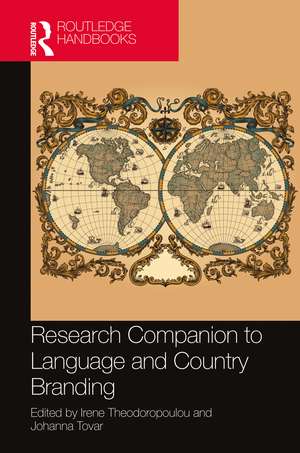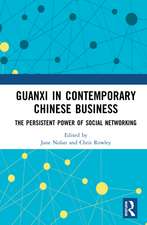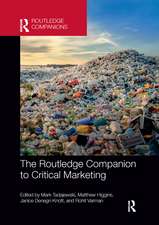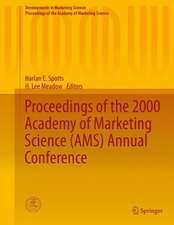Research Companion to Language and Country Branding: Routledge Studies in Language and Identity
Editat de Irene Theodoropoulou, Johanna Tovaren Limba Engleză Hardback – 17 noi 2020
Branding is a process of identity construction, whereby countries gain visibility and put themselves on the world map as distinctive entities by drawing on their history, culture, economy, society, geography, and their people. Through branding, countries aim not only at establishing their uniqueness but also, and perhaps most importantly, at attracting tourism, investments, high quality human capital, as well as at forging financial, military, political and social alliances. Against this backdrop, this volume explores how countries and regions imagine and portray others and themselves in terms of gender, ethnicity, and diversity today as well as the past. In this respect, the book examines how branding differs from other, related policies and practices, such as nation building, banal nationalism, and populism.
This volume is an essential reference for students, researchers, and practitioners with an interest in country, nation, and place branding processes.
| Toate formatele și edițiile | Preț | Express |
|---|---|---|
| Paperback (1) | 306.78 lei 6-8 săpt. | |
| Taylor & Francis – aug 2022 | 306.78 lei 6-8 săpt. | |
| Hardback (1) | 1555.23 lei 6-8 săpt. | |
| Taylor & Francis – 17 noi 2020 | 1555.23 lei 6-8 săpt. |
Preț: 1555.23 lei
Preț vechi: 1896.62 lei
-18% Nou
Puncte Express: 2333
Preț estimativ în valută:
297.62€ • 308.84$ • 248.76£
297.62€ • 308.84$ • 248.76£
Carte tipărită la comandă
Livrare economică 17-31 martie
Preluare comenzi: 021 569.72.76
Specificații
ISBN-13: 9780367343590
ISBN-10: 0367343592
Pagini: 434
Ilustrații: 4 Line drawings, black and white; 57 Halftones, black and white; 22 Tables, black and white; 61 Illustrations, black and white
Dimensiuni: 156 x 234 x 24 mm
Greutate: 0.75 kg
Ediția:1
Editura: Taylor & Francis
Colecția Routledge
Seria Routledge Studies in Language and Identity
Locul publicării:Oxford, United Kingdom
ISBN-10: 0367343592
Pagini: 434
Ilustrații: 4 Line drawings, black and white; 57 Halftones, black and white; 22 Tables, black and white; 61 Illustrations, black and white
Dimensiuni: 156 x 234 x 24 mm
Greutate: 0.75 kg
Ediția:1
Editura: Taylor & Francis
Colecția Routledge
Seria Routledge Studies in Language and Identity
Locul publicării:Oxford, United Kingdom
Cuprins
Table of Contents
List of figures
List of tables
Contributors
Acknowledgments
Disclaimer
Introduction – Irene Theodoropoulou and Johanna Tovar
Part I: Nationalism and country branding
Nationalism and politics
Chapter 1: Enregistering the nation: Bolsonaro’s populist branding of Brazil—– Daniel N. Silva
Chapter 2: The sociolinguistic saffronisation of India—– Jaspal Naveel Singh
Chapter 3: "There is a wonderfully contrary spirit among the British people": Conservative MPs’ (un)successful branding of the British nation in the Brexit debate—- Nora Wenzl
Nationalism and diversity
Chapter 4: The overflow of Peru’s country brand: National narratives, recognition, and moral brandedness in neoliberal Peru—– Gisela Cánepa Koch
Chapter 5: Sociocultural diversity: An opportunity for branding or a problem? The case of Chile—– Ignacio López Escarcena
Nationalism and cosmopolitanism
Chapter 6: "The Sweet Life" and the Russian nation: The role of a TV serial in the process of nation branding—– Katharina Klingseis
Chapter 7: Singapore’s nation branding through language policy: 'Commercial nationalism' and internal tensions—– Luke Lu
Chapter 8: Legitimizing national, striving cosmopolitan: Branding of post-Soviet city space in Almaty, Kazakhstan—– Juldyz Smagulova and Kara Fleming
Chapter 9: The republic’s new clothes: Reimaging and branding a post-reunification Germany—– Johanna Tovar
Nationalism and time
Chapter 10: The narrative arc of nation branding: Staging Shanghai World Expo 2010 in historical events—– Jackie Jia Lou
Chapter 11: "Deliver amazing": Qatar as a branded architectural discourse in World Cup 2022—– Irene Theodoropoulou
Nationalism and (in)authenticity
Chapter 12: National anxieties in polite disguise: Cool Japan branding and the inversion of globalization—– Rebecca Carlson
Chapter 13: Translation, transliteration, and translingualization: On the possibilities of 'Korea' in the linguistic landscape—– Jerry Won Lee
Part 2: Place and country branding
Place as branded destination
Chapter 14: "Milano, a place to be": Expo 2015 and the chronotopic rebranding of Italy’s moral capital—– Aurora Donzelli
Chapter 15: "We all sell wine, but it comes back to the land really": The narrative construction of place in Australian wine branding narratives—– Kerrilee Lockyer
Chapter 16: Social media branding: The case of Mykonos, Greece on Facebook—– Irene Theodoropoulou
Chapter 17: Place branding in its place—– Asif Agha
Place as a tourism-related brand
Chapter 18: Potential of destination branding for tourism promotion in Cameroon—– Evelyne N. Tegomoh and Jeff M. Molombe
Chapter 19: Tale of Two Cities: Tourist destination branding and its role in nation branding in France—– Adam Wilson
Chapter 20: Conflicts over authenticity and overtourism in destination branding: 'Blame the Bieber effect' in Iceland—– Natalia Yannopoulou, Koblarp Chandrasapth and Darren Kelsey
Index
List of figures
List of tables
Contributors
Acknowledgments
Disclaimer
Introduction – Irene Theodoropoulou and Johanna Tovar
Part I: Nationalism and country branding
Nationalism and politics
Chapter 1: Enregistering the nation: Bolsonaro’s populist branding of Brazil—– Daniel N. Silva
Chapter 2: The sociolinguistic saffronisation of India—– Jaspal Naveel Singh
Chapter 3: "There is a wonderfully contrary spirit among the British people": Conservative MPs’ (un)successful branding of the British nation in the Brexit debate—- Nora Wenzl
Nationalism and diversity
Chapter 4: The overflow of Peru’s country brand: National narratives, recognition, and moral brandedness in neoliberal Peru—– Gisela Cánepa Koch
Chapter 5: Sociocultural diversity: An opportunity for branding or a problem? The case of Chile—– Ignacio López Escarcena
Nationalism and cosmopolitanism
Chapter 6: "The Sweet Life" and the Russian nation: The role of a TV serial in the process of nation branding—– Katharina Klingseis
Chapter 7: Singapore’s nation branding through language policy: 'Commercial nationalism' and internal tensions—– Luke Lu
Chapter 8: Legitimizing national, striving cosmopolitan: Branding of post-Soviet city space in Almaty, Kazakhstan—– Juldyz Smagulova and Kara Fleming
Chapter 9: The republic’s new clothes: Reimaging and branding a post-reunification Germany—– Johanna Tovar
Nationalism and time
Chapter 10: The narrative arc of nation branding: Staging Shanghai World Expo 2010 in historical events—– Jackie Jia Lou
Chapter 11: "Deliver amazing": Qatar as a branded architectural discourse in World Cup 2022—– Irene Theodoropoulou
Nationalism and (in)authenticity
Chapter 12: National anxieties in polite disguise: Cool Japan branding and the inversion of globalization—– Rebecca Carlson
Chapter 13: Translation, transliteration, and translingualization: On the possibilities of 'Korea' in the linguistic landscape—– Jerry Won Lee
Part 2: Place and country branding
Place as branded destination
Chapter 14: "Milano, a place to be": Expo 2015 and the chronotopic rebranding of Italy’s moral capital—– Aurora Donzelli
Chapter 15: "We all sell wine, but it comes back to the land really": The narrative construction of place in Australian wine branding narratives—– Kerrilee Lockyer
Chapter 16: Social media branding: The case of Mykonos, Greece on Facebook—– Irene Theodoropoulou
Chapter 17: Place branding in its place—– Asif Agha
Place as a tourism-related brand
Chapter 18: Potential of destination branding for tourism promotion in Cameroon—– Evelyne N. Tegomoh and Jeff M. Molombe
Chapter 19: Tale of Two Cities: Tourist destination branding and its role in nation branding in France—– Adam Wilson
Chapter 20: Conflicts over authenticity and overtourism in destination branding: 'Blame the Bieber effect' in Iceland—– Natalia Yannopoulou, Koblarp Chandrasapth and Darren Kelsey
Index
Notă biografică
Irene Theodoropoulou is Associate Professor of Sociolinguistics at Qatar University. Her current research interests lie at the intersection of Modern Greek and Arabic sociolinguistics, intercultural communication and discourse analysis with politics, architecture, communication studies and sports. Her geographical areas of interest include primarily Greece and the State of Qatar. She is the author of Sociolinguistics of Style and Social Class in Contemporary Athens (2014), and her most recent publications include journal articles in Language Policy, Sociolinguistic Studies, Lingua, Journal of Arabian Studies, Discourse & Society and Visual Communication. Currently, she is the Lead PI of an Impact Grant, funded by Qatar University, on sports-related branding.
Johanna Tovar, née Woydack, is Assistant Professor at WU (Vienna University of Economics and Business) in the Department of Foreign Language Business Communication. Prior to moving to Austria, she was a postdoctoral fellow at City University Hong Kong. She received her PhD in Sociolinguistics from King’s College London and holds a master’s degree in Anthropology from the London School of Economics. She has done ethnographic fieldwork in a variety of organizations and workplaces, including call centers in Europe and Asia, pertaining to issues such as standardization, text trajectories, invisible work, resistance and compliance, monitoring, and migration. Her monograph Linguistic Ethnography of a Multilingual Call Center was published in 2019. Her most recent publications have appeared in journals such as Language in Society, the International Journal of Business Communication, English for Specific Purposes, and Sociolinguistic Studies.
Johanna Tovar, née Woydack, is Assistant Professor at WU (Vienna University of Economics and Business) in the Department of Foreign Language Business Communication. Prior to moving to Austria, she was a postdoctoral fellow at City University Hong Kong. She received her PhD in Sociolinguistics from King’s College London and holds a master’s degree in Anthropology from the London School of Economics. She has done ethnographic fieldwork in a variety of organizations and workplaces, including call centers in Europe and Asia, pertaining to issues such as standardization, text trajectories, invisible work, resistance and compliance, monitoring, and migration. Her monograph Linguistic Ethnography of a Multilingual Call Center was published in 2019. Her most recent publications have appeared in journals such as Language in Society, the International Journal of Business Communication, English for Specific Purposes, and Sociolinguistic Studies.
Recenzii
An authoritative collection offering a comprehensive account of the ways in which places are branded. Covering an impressive geo-political range of contexts and employing a variety of theoretical and analytical approaches, this book breaks new ground in contemporary sociolinguistic inquiry.
- Tommaso Milani, Professor of Multilingualism, University of Gothenburg
Language and symbols are at the heart of the nation’s brand. Bringing together expert contributions from linguistics, anthropology and management, Theodoropoulou and Tovar show us how to recognize the power and limits of discursive and semiotic forms. This robust and multidisciplinary volume will be of use to international practitioners, policy makers and scholars to make sense of national promotion in global communication circuits.
- Melissa Aronczyk, Associate Professor of Journalism & Media Studies, Rutgers University
In this timely and impressive collection, Theodoropoulou and Tovar bring together a wide range of case studies on place and nation branding in a world on the cusp of the C19 pandemic. The book persuasively demonstrates the centrality of discourse and the confluence of politics, profits and partisanship in contemporary nation building.
- Adam Jaworski, Chair Professor of Sociolinguistics, University of Hong Kong
Research companion to language and country branding is a wide-ranging, interdisciplinary, polyvalent, and theoretically innovative book suited both for novices and experts. It is written by scholars and researchers from different disciplines and as both a theoretical and practical ‘companion’ for those interested in the role of language in country branding.
- Giovanna Parmigiani, Harvard Divinity School and CSWR, Harvard University
- Tommaso Milani, Professor of Multilingualism, University of Gothenburg
Language and symbols are at the heart of the nation’s brand. Bringing together expert contributions from linguistics, anthropology and management, Theodoropoulou and Tovar show us how to recognize the power and limits of discursive and semiotic forms. This robust and multidisciplinary volume will be of use to international practitioners, policy makers and scholars to make sense of national promotion in global communication circuits.
- Melissa Aronczyk, Associate Professor of Journalism & Media Studies, Rutgers University
In this timely and impressive collection, Theodoropoulou and Tovar bring together a wide range of case studies on place and nation branding in a world on the cusp of the C19 pandemic. The book persuasively demonstrates the centrality of discourse and the confluence of politics, profits and partisanship in contemporary nation building.
- Adam Jaworski, Chair Professor of Sociolinguistics, University of Hong Kong
Research companion to language and country branding is a wide-ranging, interdisciplinary, polyvalent, and theoretically innovative book suited both for novices and experts. It is written by scholars and researchers from different disciplines and as both a theoretical and practical ‘companion’ for those interested in the role of language in country branding.
- Giovanna Parmigiani, Harvard Divinity School and CSWR, Harvard University
Descriere
Research Companion to Language and Country Branding brings together entirely new interdisciplinary research conducted by scholars working on various sociolinguistic, semiotic, anthropological and discursive analytical aspects of country branding all over the world.





























